Some breeds aren’t just more alert—they’re more emotionally attuned. Being around their humans isn’t just about companionship.
According to the American Kennel Club (AKC), it turns out that nearly one‑third of pet dogs experience noise sensitivity, which ranks as the most common anxiety trait among them. That statistic alone hints at something deeper: certain dogs are wired to feel more intensely.
Researchers in psychology have even developed a questionnaire to measure sensory processing sensitivity—a trait that exists not only in humans but in dogs too, and reflects deep emotional processing and over-arousal.
For these dogs, keen awareness of changes in tone, mood, or rhythm can trigger genuine stress. That makes them exceptional when matched with the right care, but vulnerable without it.
You’ll see that these psychiatrically sensitive dogs crave calm routines, consistent mental stimulation, and environments that honor their emotional needs. They form strong bonds easily, pick up on human emotions in subtle ways, yet they may also struggle when their sensitivity isn’t understood.
Most Psychiatrically Sensitive Dog Breeds
Here are the 7 dog breeds:
1. Labrador Retriever
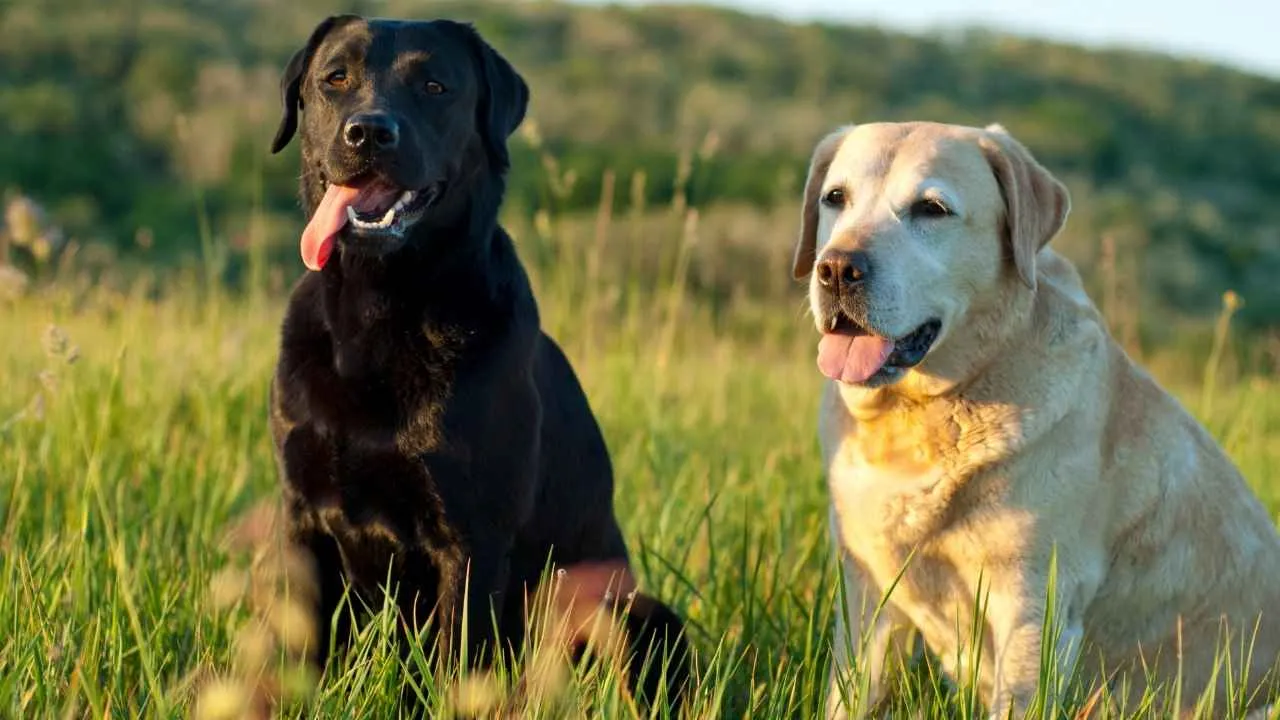
The Labrador Retriever is often celebrated as one of the most emotionally perceptive breeds, and for good reason. Known to sense shifts in mood, Labs can often anticipate their owner’s emotional state before a single word is spoken.
This makes them one of the most exceptional psychiatric service dogs, especially for individuals coping with post-traumatic stress disorder or anxiety. Their combination of mental and physical stimulation needs, coupled with their desire to stay close to their people, makes them incredibly responsive companions.
Natural Swimmers
Labradors have webbed feet and a water-resistant double coat, making them built for swimming. Originally bred to retrieve fishing nets and waterfowl, they still love a good swim and are naturals in the water.
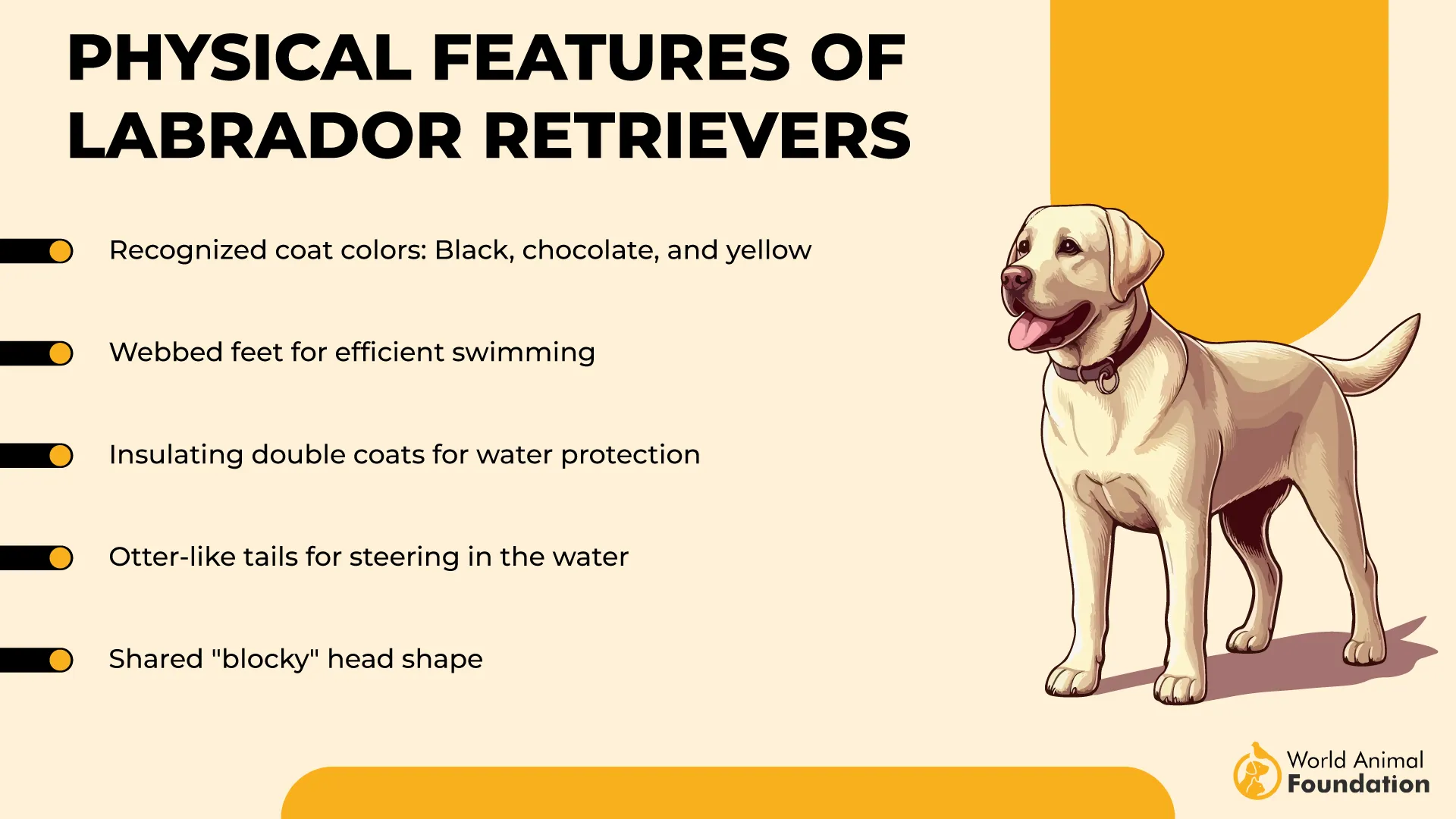
Versatile Workers
From search and rescue to narcotics detection, Labs are among the most widely employed working dogs. Their keen sense of smell, intelligence, and eagerness to work make them perfect for high-responsibility roles.
Food-Motivated Learners
Their strong food drive means they respond quickly to obedience training. This makes them one of the best dog breeds for beginners or anyone looking for a highly trainable companion.
2. Golden Retriever
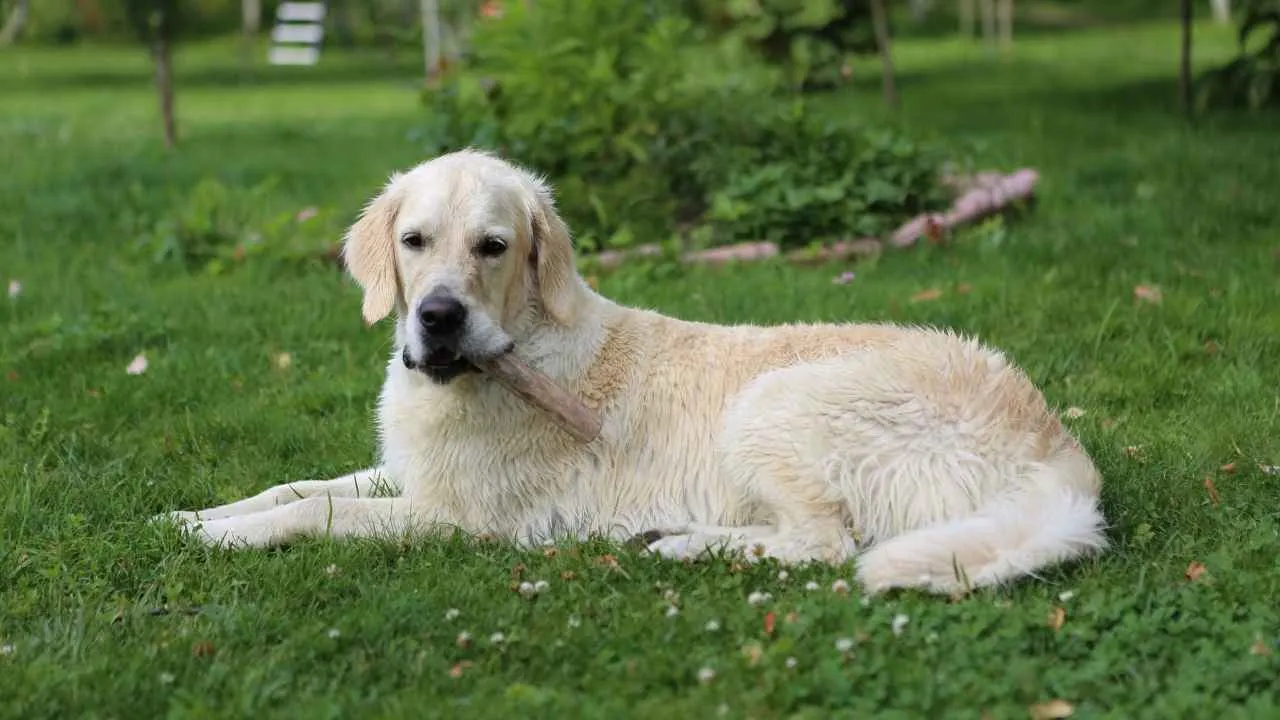
Golden Retrievers are one of the most beloved emotional support dogs, and it’s easy to see why. Their warm, patient personalities make them ideal companions for individuals dealing with anxiety, depression, or trauma-related conditions.
Known for their calm demeanor and intuitive response to human emotions, Golden Retrievers don’t just offer comfort—they actively seek it out. Their affectionate nature shines in everyday moments, whether it’s a gentle nudge when you’re low or simply staying close when silence says more than words.
Feathered Coats
One of the standout traits of Golden Retrievers is their long, feathered double coat. It’s not just beautiful—it also offers weather resistance, a nod to their origins as retrieving dogs in the chilly waters of Scotland.
Naturally Mouthy
Goldens have a famously soft mouth. They were bred to retrieve game without damaging it, which is why they’re often seen gently carrying toys—or even your sock—around the house without leaving a mark.
Eternal Optimists
Golden Retrievers are known for their upbeat, goofball personalities. Their cheerful personality and eagerness to please make them excellent companions for both play and relaxation, striking a perfect balance between fun and emotional grounding.
3. Poodle
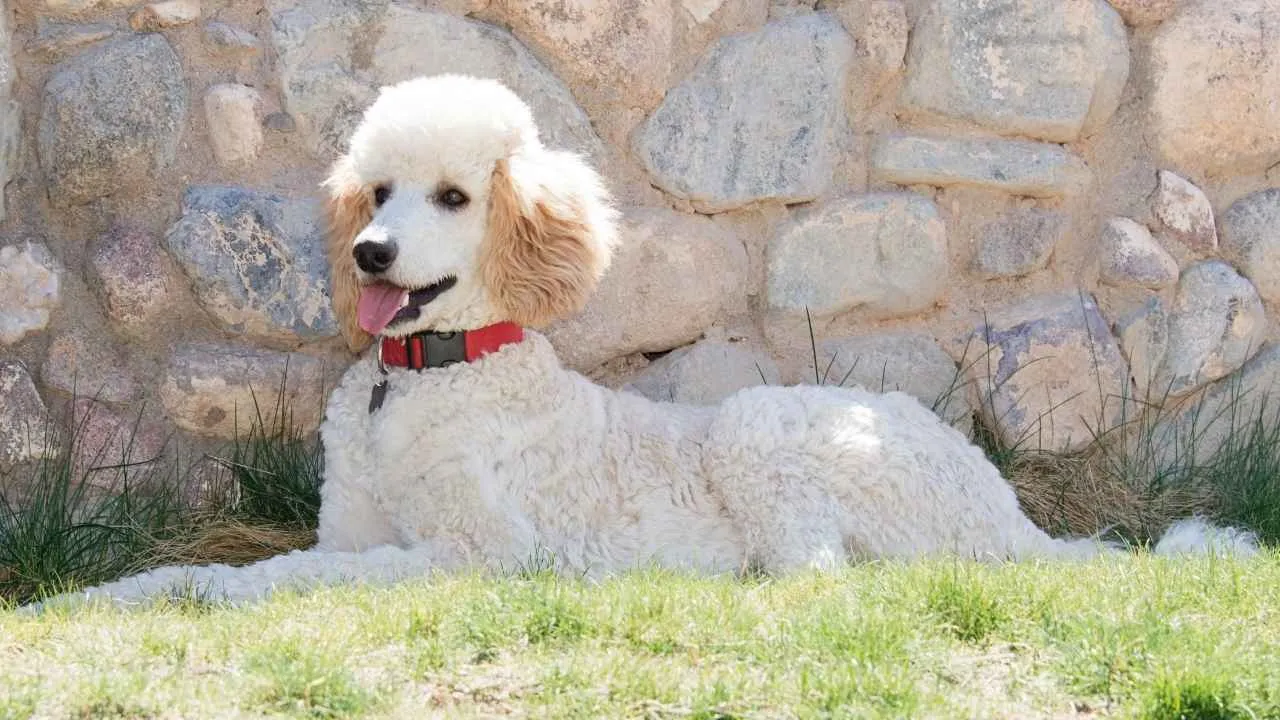
Poodles are often overlooked when it comes to emotional support roles, but they’re among the most adaptable and responsive breeds out there.
Their high intelligence allows them to pick up on subtle cues, making them perfect psychiatric service dogs for those managing complex emotional or mental health challenges. Their status as beloved companion dogs is well earned, not just for their looks, but for the loyalty and intuition they bring to the table.
Iconic Curls
The Poodle’s dense, curly coat is more than just style—it’s practical. Originally bred as water retrievers, their curls helped insulate their joints and chest while they worked in cold environments. Today, it’s also why they’re a favorite among allergy sufferers.
Athletic Grace
Don’t be fooled by the fancy grooming—Poodles are athletes. With their lively companions’ energy and springy gait, they thrive in dog sports like agility and obedience, where their keen intelligence and physical agility shine.
Grooming Royalty
According to Hills Pet, Poodles require frequent grooming, and their show-ring hairstyles actually stem from functional origins. Though many owners prefer a simpler trim, the breed’s grooming needs reflect a history of working in water, not just aesthetic flair.
4. Cavalier King Charles Spaniel
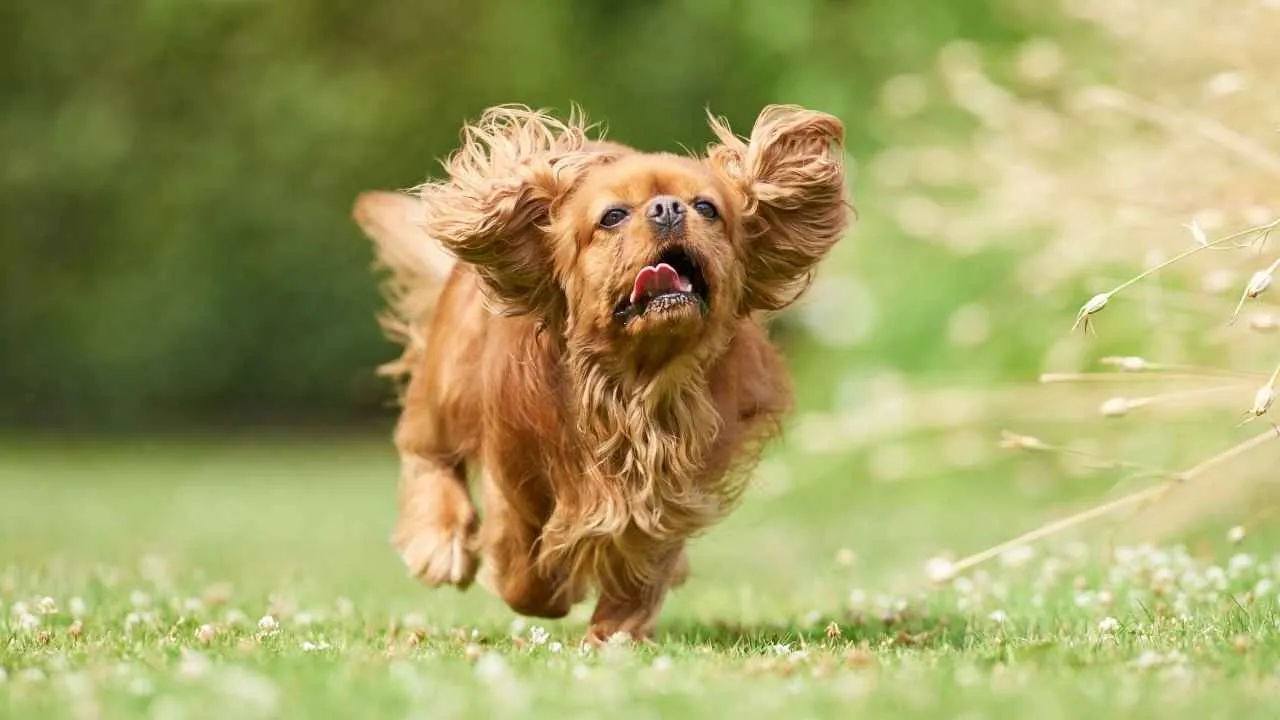
The Cavalier King Charles Spaniel is often recognized as one of the most emotionally in-tune breeds—a true comfort companion for those navigating daily emotional challenges. What sets this breed apart is their natural instinct to stay close and offer warmth, both physically and emotionally.
As one of the most intuitive among certain breeds, they’re incredibly responsive to mood changes, often curling up beside you the moment they sense stress or sadness. This is a breed that thrives on bonds with their owners, often following their human from room to room, not out of neediness, but genuine loyalty and care.
Royal Roots
Originally bred for English nobility, the Cavalier carries a legacy of lapdog luxury. Their long history as beloved family pets makes them naturally social, adaptable, and eager to be involved in daily life.
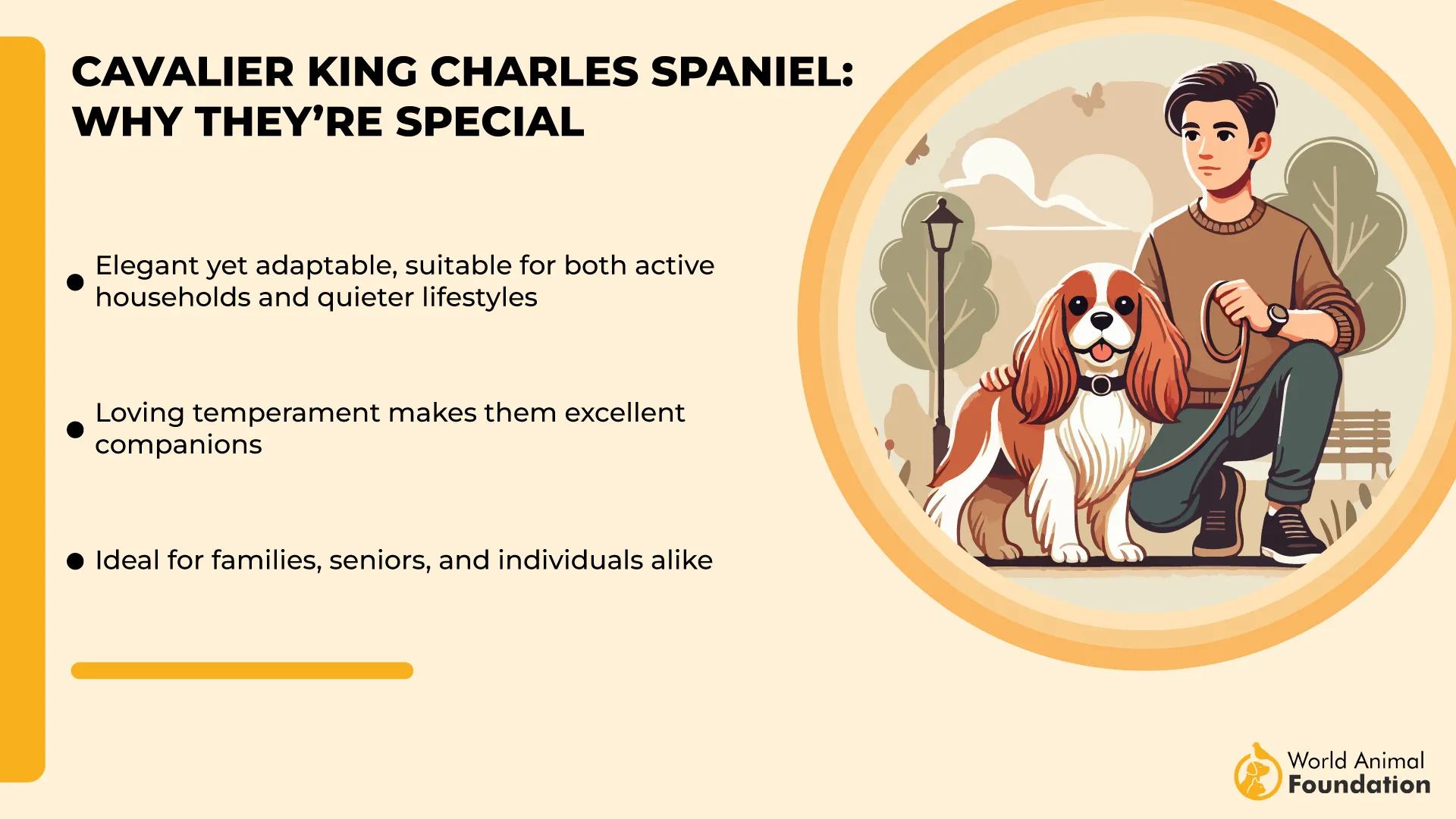
Feathered Elegance
A signature trait of the breed is the long feathering on their feet and ears. This silky, medium-length coat gives them a distinct elegance—and yes, it’s show-ring approved when left untrimmed.
Gentle Expression
One look at a Cavalier’s large, dark, expressive eyes and you’ll understand their appeal. According to Britannica, their facial structure is purposefully soft, giving them a perpetually kind and tender expression that reflects their loving nature.
5. German Shepherd
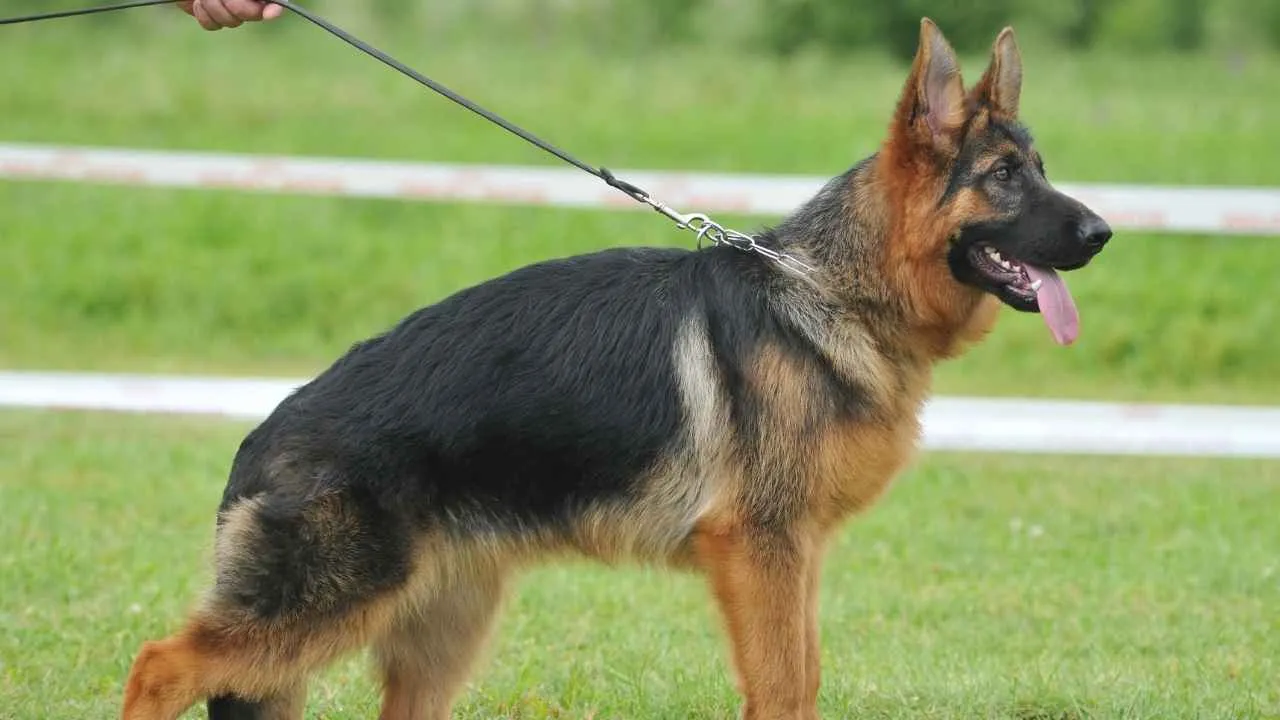
German Shepherds are among the most capable and steady-minded emotional support animals, especially for individuals managing severe anxiety or post-traumatic stress disorder.
Their calm yet alert temperament means they can stay composed in high-pressure environments, offering unwavering presence when it matters most. For many dog owners, this breed’s loyalty is unmatched—they’re not just pets, they’re partners.
Law Enforcement Legends
German Shepherds are staples in law enforcement worldwide. With their keen noses and unmatched focus, they’re trusted in everything from narcotics detection to search-and-rescue missions.
Natural Herders
True to their name, these dogs were originally bred for herding sheep. Their strong instincts for control, direction, and protection are still visible in the way they naturally position themselves between their human and any perceived threat.
Physical Powerhouse
With their muscular build and athleticism, German Shepherds excel in dog sports and agility training. This physical capability isn’t just impressive—it gives them the stamina and responsiveness needed for both work and play.
6. Doberman Pinscher
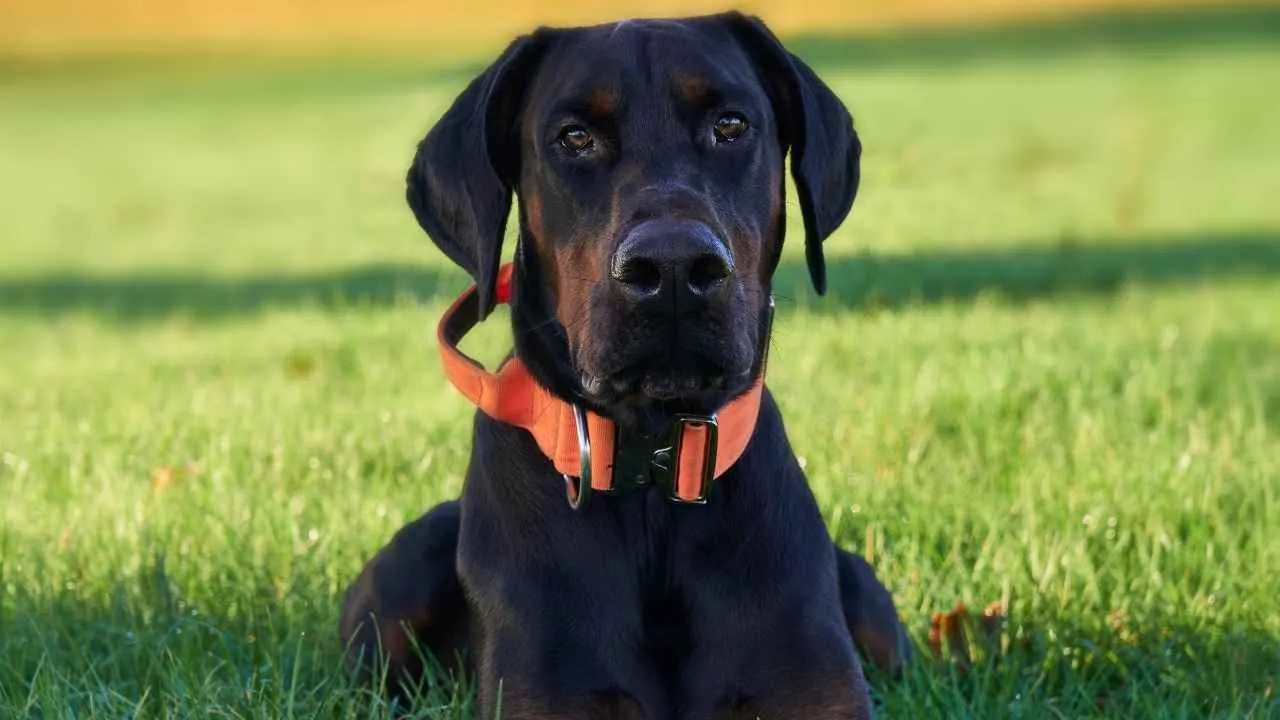
At first glance, the Doberman Pinscher may seem like an unlikely candidate for emotional support, but beneath their alert stance lies one of the most loyal and emotionally intelligent breeds around. When trained properly, Dobies excel as psychiatric service animals, offering tactile grounding, watchful presence, and calm focus during moments of distress.
They form incredibly tight bonds with their handlers and thrive on human companionship, making them highly effective for individuals coping with PTSD or panic disorders. For many dog lovers, their appeal lies in that rare mix of quiet strength and intense devotion. Dobermans don’t just stay close; they anchor you.
Sleek Strength
With their muscular build, chiseled features, and short, sleek coat, Dobermans embody elegance in motion. Their athleticism isn’t just for show—it supports their stamina, speed, and work ethic, especially in active households or during training.
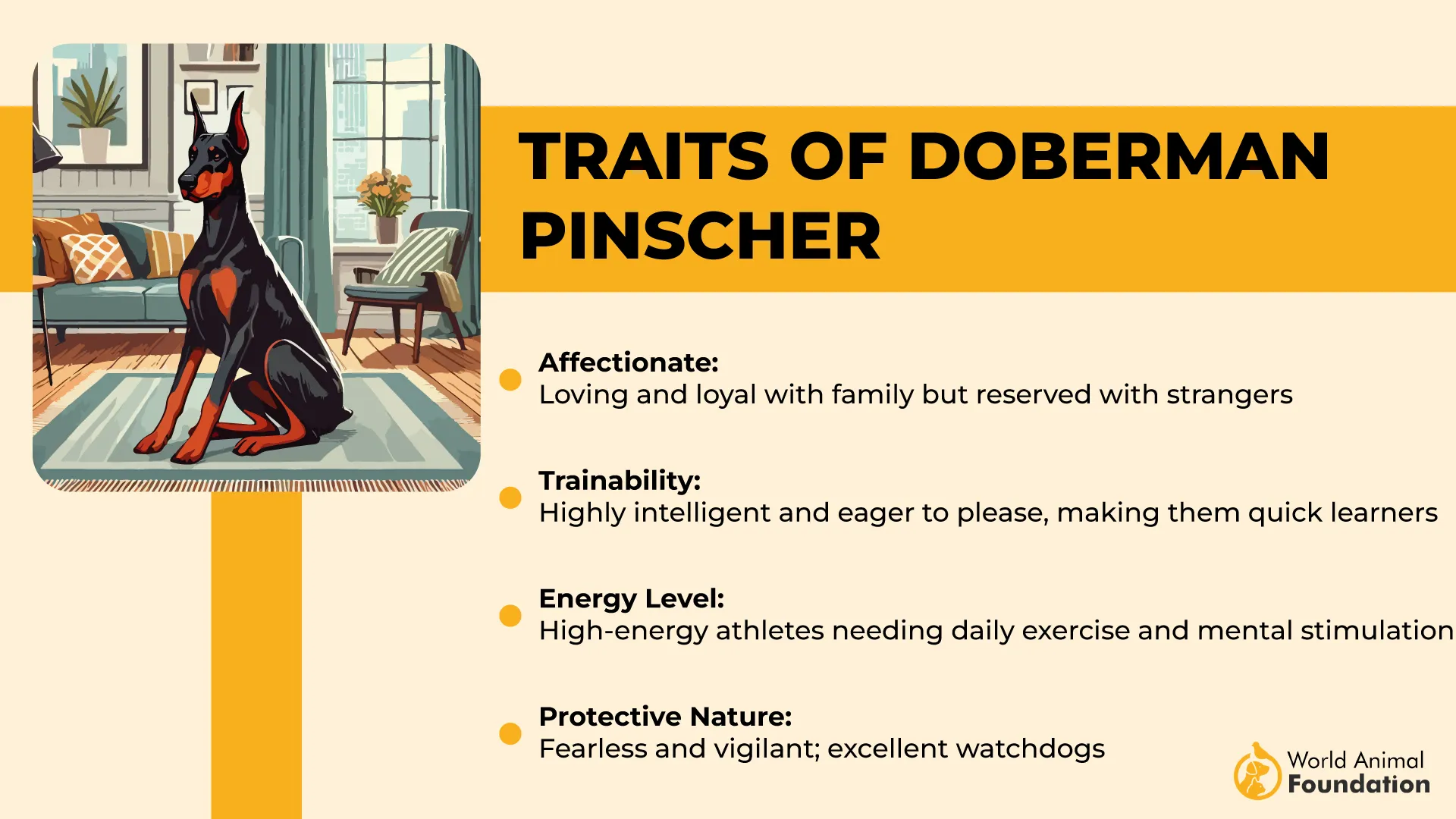
A Legacy of Loyalty
Bred originally by Louis Dobermann to protect him during tax collection rounds, the breed quickly became synonymous with police, military, and therapy work. Their protective instincts are paired with a strong sense of loyalty that rarely wavers.
Social Potential
With proper early socialization, Dobies can thrive around children and other dogs. Despite their reputation, they’re not naturally aggressive—they’re watchful, affectionate, and eager to please when raised in a stable, respectful environment.
7. Lhasa Apso
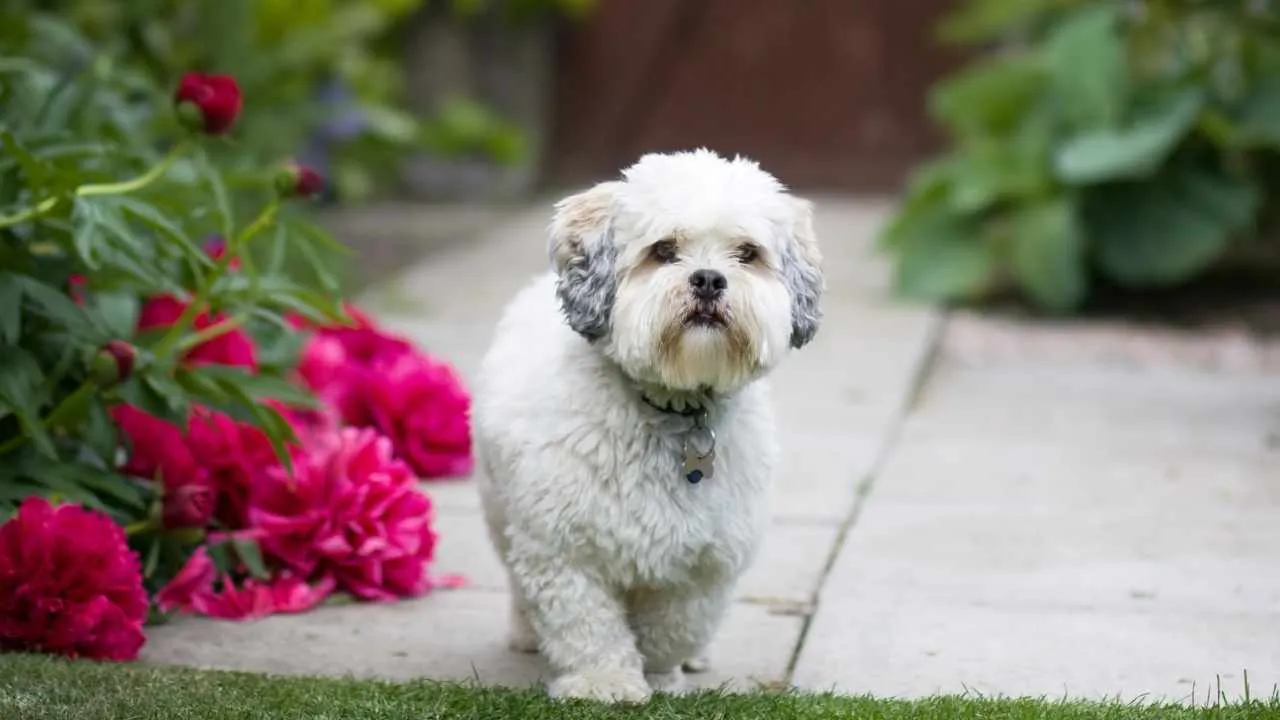
Small but full of purpose, the Lhasa Apso is more than just a fluffy lap dog. Bred in ancient Tibetan monasteries as alert watchdogs, they bring a deep sense of loyalty and awareness into the lives of those they bond with.
Their ability to sense emotional shifts and gently redirect their owners makes them surprisingly effective as companions for people managing a mental health disorder like PTSD or depression. Once trained, these dogs don’t just offer comfort—they actively participate in emotional regulation.
Comedy with a Coat
Lhasas have a natural flair for drama and humor. Their expressive faces and comic timing make them entertaining without even trying. They often lift moods just by being themselves—something you don’t often get with more serious or high-energy dogs.
Apartment-Friendly Watchdogs
They don’t need a big backyard to thrive. Lhasas adapt well to smaller living spaces, as long as they’re socialized early and trained to manage their tendency to bark. You get a compact size without sacrificing their protective instincts.
Longevity and Loyalty
These dogs are in it for the long haul. With proper care, a Lhasa Apso can be by your side for 15 years or more. That consistency is no small thing when dealing with long-term mental health challenges—it’s one more thread of stability in your daily life.
Conclusion
In the end, the most psychiatrically sensitive dogs aren’t defined by breed but by their deep emotional intuition and friendly nature. These animals offer more than just companionship—they provide genuine therapeutic benefits, often sensing emotional shifts before we do. While some traits are more common in certain types, it’s important to remember that individual personality traits play a much bigger role than labels.
Many dogs, regardless of background, can be incredibly attuned to human emotions. It’s this connection that makes them so valuable, not just as pets, but as partners in emotional wellness. And yes, there are plenty of other breeds out there with just as much heart and sensitivity.


